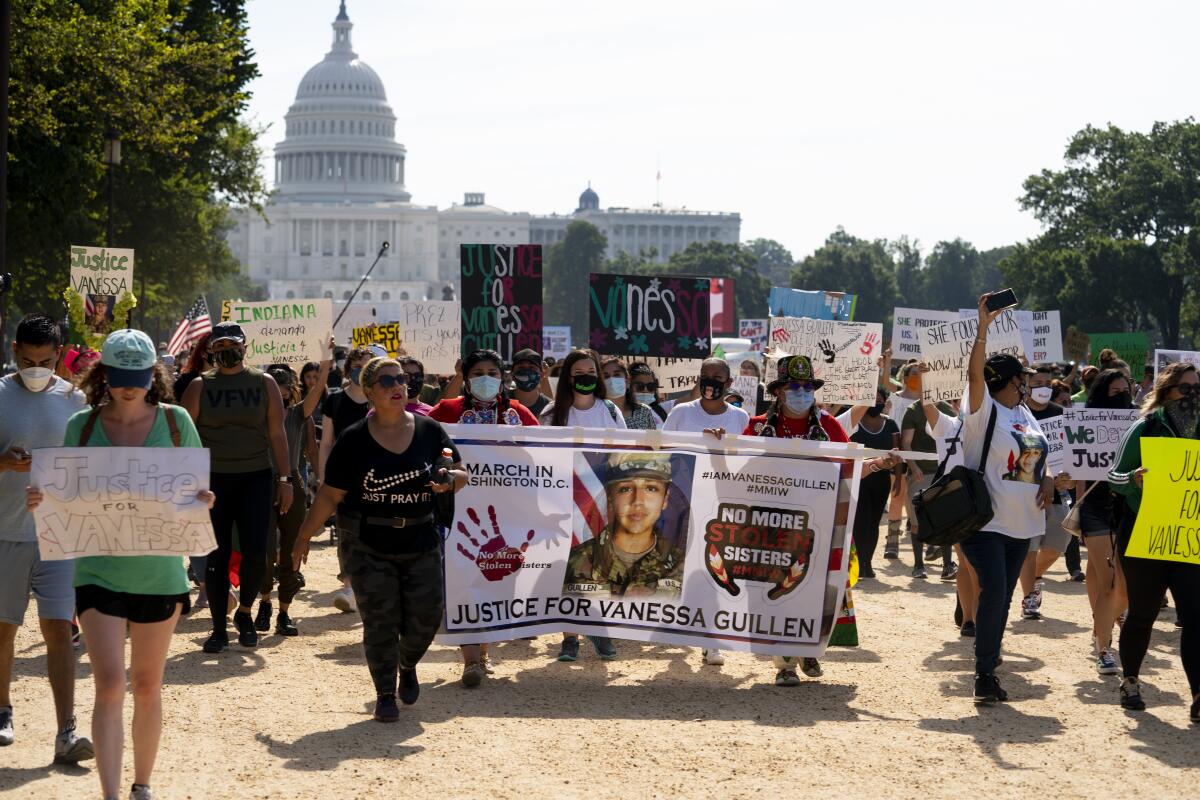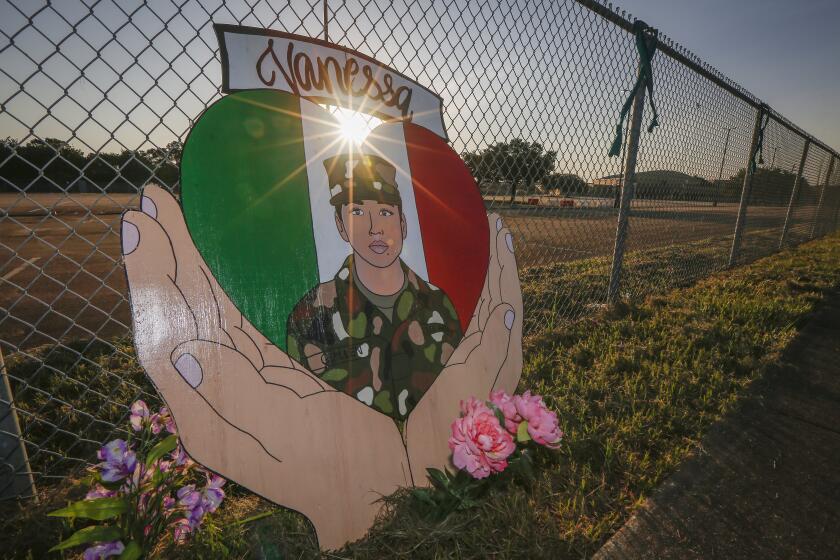‘The military’s #MeToo moment’: Ft. Hood victims speak out

- Share via
AUSTIN, Texas — Maria Valentine says she was just months into her training at Ft. Hood in 2006 when a sergeant with a history of alleged harassment toward other soldiers wrote her up after she complained she didn’t want him touching her during body-mass measurements.
She said authorities promised that the disciplinary report against her would be wiped from her record if she didn’t make a formal complaint. Valentine’s decision not to file one would haunt her years later when she learned that another woman had accused the same sergeant of rape.
Valentine is one of five women — two active-duty soldiers, two veterans and one civilian — who spoke to the Associated Press about experiencing harassment, assault or rape by male soldiers at the U.S. Army base in Texas. The other four women detailed experiences that they say happened since 2014.
Current and former soldiers have taken to social media with their own accounts of sexual assault and harassment at the base following the disappearance and slaying this year of Spc. Vanessa Guillen, who family members say was sexually harassed by the soldier who eventually killed her.
“I wasn’t surprised,” Valentine said after learning about Guillen’s story. “That was the environment. I live with the regret that I did not go through with the complaint.”
Maj. Gabriela Thompson, a Ft. Hood spokeswoman, told the AP that she had no information about Valentine’s allegation.
Mourners honor Army Spc. Vanessa Guillen, whose death has prompted a new push for changes in how the military handles sexual abuse and harassment.
Members of Congress launched an investigation of Ft. Hood in September after Sgt. Elder Fernandes was found dead Aug. 25 hanging from a tree in Temple, Texas, months after reporting sexual harassment.
Guillen and Fernandes are among 28 soldiers at the base to have died this year, including five homicides and six suicides, according to Army data. Army Secretary Ryan McCarthy says that, based on Ft. Hood’s average of 129 violent crimes between 2015 and 2019, it has one of the highest violent crime rates among Army installations.
The Associated Press typically doesn’t publish the names of sex-abuse victims, but two women who said they were sexually assaulted by soldiers at Ft. Hood decided to speak on the record to describe what they say is a disturbing culture at the base. Many victims have become connected by sharing their experiences using the hashtag #IAMVANESSAGUILLEN.
Among them is Deborah Urquidez, who told the AP that she was raped by the same sergeant, Staff Sgt. Roberto Jimenez, who Valentine said harassed her more than a decade earlier.
Military is on the spot over sexual assaults
Urquidez said her relationship with Jimenez in 2014 began consensually, but that later he raped her while a friend desperately tried to break into the room to stop him. Then came months of stalking, threatening messages and a lengthy battle in military court in which he was found not guilty, according to court documents obtained by the AP.
Urquidez was given a temporary military protective order against the sergeant for an “alleged sexual assault.”
The Department of Veterans Affairs considers her permanently disabled after she reported the rape and the trauma from it, which gave rise to multiple suicide attempts, according to documents obtained by the AP.
“There was never justice for me,” Urquidez said. “In any other world, what more evidence do you need?”
Jimenez later filed for a protective order against Urquidez. A Ft. Hood spokesperson said the Army’s Criminal Investigation Command investigated and that Jimenez was acquitted of all charges following a court-martial in 2017. He remains on active duty at Ft. Bliss, which is also in Texas.
Officials from Ft. Bliss did not provide comment from Jimenez. But they said the base upholds the U.S. Army’s standards against sexual harassment and sexual assault and takes all reports seriously and investigates them quickly.
Breaking News
Get breaking news, investigations, analysis and more signature journalism from the Los Angeles Times in your inbox.
You may occasionally receive promotional content from the Los Angeles Times.
Kaitlyn Buxton, a civilian, said her partner, Brandon Espindola, then stationed at Ft. Hood, beat her numerous times and raped her in 2018 at their off-base apartment in Killeen. On one occasion at the barracks, he pinned her down and repeatedly punched her in the face while she screamed for help, Buxton alleged.
A Ft. Hood officer went with his wife to their apartment during one altercation after Buxton called for help. Buxton said members of Espindola’s chain of command saw her body bruised on more than one occasion.
The Killeen Police Department eventually granted Buxton a protective order and charged Espindola with assault with bodily injury and assault by strangulation, but records show that he bonded out and the case was closed.
Buxton said military police have taken no action on a separate case she filed in 2018, which was briefly closed and then reopened this past August. Espindola has since been discharged from the Army on unrelated matters.
“The whole process has been a constant victimization,” Buxton said. “No matter what I do, my voice is not being heard.”
Sean Timmons, Espindola’s attorney, said his client “maintains his innocence to all allegations and charges and believes they are fabricated.” The Killeen Police Department did not respond to a request for comment. A Ft. Hood spokesperson said the fort had no information on this allegation.
Harvey Weinstein faces six additional sexual assault charges in L.A. involving two more accusers.
According to a federal complaint, the soldier who killed Guillen, Aaron Robinson, died by suicide in July when confronted by police. Natalie Khawam, who represents the Guillen family, told the AP that Guillen shared with family members that a soldier of superior rank walked in and watched her when she was showering. Khawam said Guillen was too scared to file a report.
McCarthy, the Army secretary, said that although it is believed Guillen faced other kinds of harassment at Ft. Hood, officials have found no report or evidence that she was sexually harassed. Since then, an independent inquiry into the command climate at the Texas base has been ordered, in addition to the ongoing investigation into the command response to Guillen’s disappearance and death.
In a news conference the morning after Fernandes’ body was found, Lupe Guillen, the younger sister of Vanessa Guillen, said Fernandes was an example of why her sister did not report the harassment she experienced.
“How many more must die at Ft. Hood for them to be held accountable?” Lupe Guillen said. “How many more have to be sexually harassed?”
California Rep. Jackie Speier (D-Hillsborough), who is among the members of Congress investigating Ft. Hood, has coauthored a bill, named after Guillen, that aims to expand measures to prevent sexual assault and harassment involving U.S. military personnel, including codifying sexual harassment as a crime in military law and removing decisions on whether to prosecute from the chain of command.
“The voices of those survivors have never been louder or more clear,” Speier said. “This is the military’s #MeToo moment.”
More to Read
Sign up for Essential California
The most important California stories and recommendations in your inbox every morning.
You may occasionally receive promotional content from the Los Angeles Times.















